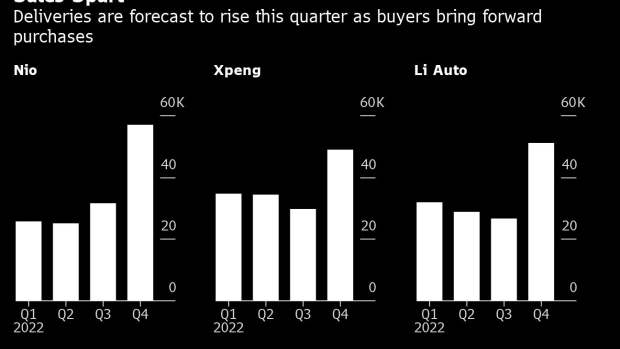Oct 31, 2022
China's Electric Car Upstarts Face a Crucial Earnings Season
, Bloomberg News

(Bloomberg) --
The gloss is coming off China’s three US-listed electric-car makers.
Shares of Xpeng Inc. (-86%), Nio Inc. (-69%) and Li Auto Inc. (-56%) have plunged this year, destroying a combined $77 billion in market value.
While some factors have been out of the automakers’ control — such as fears Chinese companies could be delisted from US exchanges, and investor concern over Xi Jinping’s consolidation of power — there’s no denying shareholders are looking for hard evidence the trio are on track to turn profitable after years of losses.
There are several headwinds on that front. Battery material costs have been surging, sales growth even in China’s booming EV market has been less-than-stellar, and intensified competition from homegrown rival BYD Co. and Elon Musk’s Tesla Inc. is squeezing margins.
On top of that, there’s the long-running semiconductor shortage, and China’s rolling Covid Zero lockdowns that have snarled supply chains show no signs of ending anytime soon.
That makes third-quarter earnings to be released in the next couple of weeks crucial.
“Gross margins will be a key focus because earlier prices hikes should start to help offset battery cost inflation,” said Bloomberg Intelligence auto analysts Steve Man and Joanna Chen. “We’re also looking for color on supply chains and new model order intake.”
The news there is likely to be mixed, at best. Nio, for example, is expected to post a gross margin of 15.1% in the three months ended Sept. 30, down from 20.3% a year earlier, according to data compiled by Bloomberg. Li Auto is expected to report a gross margin of 20.6%, down from 21.1%.
All three are expected to post another quarter of losses, throwing further doubt on their own projections of breaking even or turning profitable in the near term. Xpeng is forecast to report a 1.86 billion yuan ($257 million) quarterly loss and may miss its target to be profitable by as soon as next year.
While the trio may blame the Covid turmoil and supply chain issues for their unsatisfactory delivery numbers, they’re harder to explain away in the face of the exceptional performance of BYD. The automaker backed by Warren Buffett’s Berkshire Hathaway sold a record 200,973 electric vehicles last month — equal to three-quarters of Xpeng, Li Auto and Nio’s combined sales in the first nine months of 2022.
Dwarfed by their “less cool” local competitor, the upstarts may learn a lesson that most Chinese customers are looking for a sharply priced ride, rather than a fully spec’d high-tech model with features they rarely use.
Tesla seems to have got that message, as it cut prices across its lineup in China even after delivering a record 83,135 cars last month. With its Shanghai factory now capable of churning out about 1 million cars a year following an upgrade, the company now needs to attract more buyers.
One bright spot is that after stalling in the third quarter, deliveries should jump in the final three months of the year as buyers bring forward purchases before EV subsidies are potentially phased out.
Still, confronted with more muscular, deeper-pocketed rivals and unpredictable economic environment, Xpeng, Nio and Li Auto may be facing a rough ride ahead.
©2022 Bloomberg L.P.





